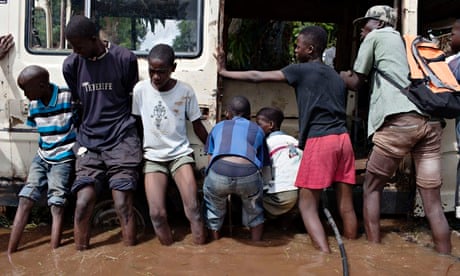If no one is to be left behind in the next development goals, logic suggests the needs of the world's least developed countries (LDCs) should have particular prominence. Instead, those countries fear their interests will be sidelined in negotiations leading up to 2015.
Until now, talks on a framework to succeed the millennium development goals (MDGs) have been dominated by the UN development agencies and New York-based diplomats.
"There is a danger of these agencies steamrolling ahead with their own agendas, while drowning out the voices of countries that will be most heavily impacted by the new goals," says Tom Bigg, head of partnerships at the International Institute for Environment and Development (IIED). "The process has assumed – wrongly – that all nations share the same set of values, and it has failed to demonstrate what's in it for the LDCs."
The 49 LDCs, which include Bangladesh and South Sudan, have continued to lag well behind in most development indicators. The substantial reductions in poverty rates of the past 20 years have largely passed them by. Almost half of the population of LDCs, nearly 450 million people, falls within the international definition of "absolute poverty" – earning less than $1.25 (75p) a day.
Even where poverty rates are going down, absolute numbers remain high. In Bangladesh – which, after a decline in poverty of 16 million people (26%) between 2000-2010, is considered a success story – nearly 50 million people are still living below the international poverty line. Since the establishment of the LDC category in 1971, only three countries have "graduated": Botswana in 1994, Cape Verde in 2007 and Maldives in 2011. Samoa is due to graduate this year.
Although a diverse group in terms of geography and natural resources, many LDCs share common problems such as high vulnerability to climate change and conflict; one-third are landlocked. Collectively, the LDCs have a set of minimum demands that should be reflected in the next set of development goals as outlined by Gyan Acharya, the UN under-secretary and high representative of the LDCs, at a meeting this week on LDC priorities after 2015.
Speaking in the bucolic Sussex countryside setting of Wilton Park, Acharya said official development assistance should focus more on the LDCs. As the gathering of development experts heard, it is not necessarily the poorest countries that receive large amounts of aid, but those considered strategically important to donors, such as Pakistan or Egypt.
With aid budgets under pressure, LDCs are looking at alternatives, including money from major pension funds, sovereign wealth funds and other sources of private capital. However, an LCD expert group co-ordinated by IIED, one of the organisers of the meeting, has questioned the effectiveness and net benefits of a private sector model, noting evidence of "cherry picking" of the most profitable areas and the danger that foreign firms may undermine the private sector in LDCs.
Acharya said a possible source of non-traditional finance could come from the embryonic UN Green Climate Fund. The fund is supposed to have $100bn a year by 2020 to tackle the impacts of climate change, such as floods and droughts. A certain percentage of the fund should be allocated to the LDCs, suggested Acharya, with the same approach applied to any future financial transactions tax.
Climate change is a huge worry for the LDCs, but they fear their concerns will be sidelined not just by the rich countries, but also by the rising Brics economies. Brazil, Russia, India, China and South Africa emit more greenhouse gases than the US or the EU and are reluctant to accept emission limits that will hinder economic growth.
"The LDCs are understaffed and will be outsmarted by the Brics," said one participant at Wilton Park, referring to the current discussions of the open working group on sustainable development goals, an intergovernmental body. Parallel to that, an expert group on financing for sustainable development is also meeting.
A fairer trade deal is a longstanding LDC demand. Doha negotiations of the World Trade Organisation (WTO) are still chugging along, impeding fuller market access for the LDCs. Acharya said the group wanted rich countries to meet their commitment to grant duty- and quota-free access for 97% of LDC exports.
As things stand, 83% of LDC products have that access. This sounds high, but the catch is that the remaining 17% covers most of the products that LDCs can export, particularly garments and agricultural goods. Average tariffs on textiles and clothing have not declined, and the level of trade-distorting subsidies in the west for agricultural products has not been reduced significantly.
While LDCs have long argued for special treatment, there is also strong support for a development framework that is universal, demanding parallel commitments from all countries (unlike the MDGs, where donor and recipient countries had different roles and commitments). However, there is no clear consensus on how universality should be framed to achieve LDC objectives.
The LDC independent expert group is calling for a "new type of compact … from which no country is exempted or can exempt itself from responsibility to address global problems". But as one participant at this week's meeting put it, while the UN high-level panel on the new development agenda has said no one should be left behind, the question is whether LDCs will be.

Comments (…)
Sign in or create your Guardian account to join the discussion